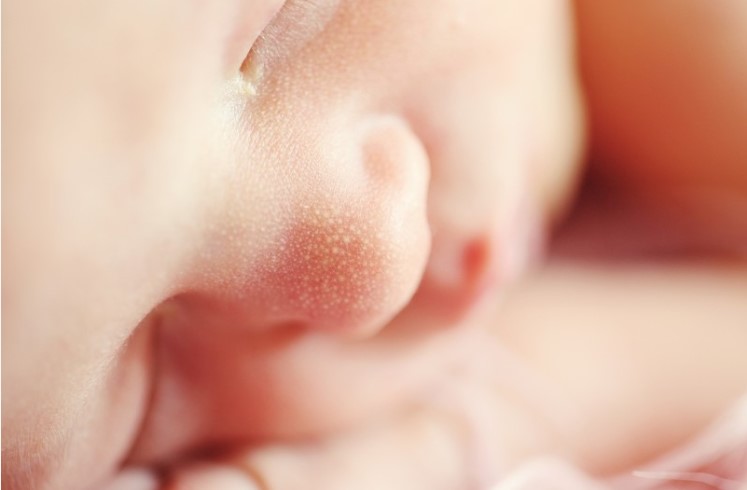Newborn babies sleep a lot. Expect your baby to be asleep for up to 18 hours out of every 24 in his first few weeks. But he won’t sleep for more than one hour to three hours at a time, day or night, as he will need frequent feeds. This means that you can expect some sleepless nights, especially at first. This is a just a phase your baby needs to move through and it won’t last long. Although it can seem like an eternity when you’re sleep-deprived. Your baby’s sleep cycles are far shorter than yours. He’ll spend more time in rapid eye movement (REM) sleep, which is a light, easily disturbed sleep. This is necessary for the changes that are happening in his brain.
Once he is between six weeks and eight weeks your baby will probably sleep for shorter spells during the day and longer periods at night. But he’ll still wake up to feed during the night. He’ll have more deep, non-REM sleep and less light sleep. It’s possible that your baby may sleep through the night as early as eight weeks old. Every baby is different though and it’s more likely your nights will be interrupted for at least the first few months. If your aim is to get your baby to sleep through the night, encouraging clear habits from the start will help.
Your baby can develop good sleep habits from as early as six weeks. This is the point at which he starts to develop his natural circadian rhythms, which is the process that helps regulate his sleep-wake cycle. Here are a few tactics you can use to help your baby settle. Recognise the signs that mean he’s tired. For the first six weeks to eight weeks, your baby probably won’t be able to stay up for more than two hours at a time. If you wait much longer than that to put him down, he’ll be overtired and won’t nod off easily.
During your baby’s first three months, learn the signs that he’s sleepy, such as:
- rubbing his eyes
- flicking his ear with his hand
- faint, dark circles under his eyes
- whining and crying
- staring blankly into space
- yawning and stretching a lot
- losing interest in people and his toys
- becoming quiet and still
He may also turn his face away from moving objects or people, or bury his face in your chest. If you spot these or any other signs of sleepiness, try putting your baby down in his cot or Moses basket. Don’t worry, you’ll soon come to recognise your baby’s daily rhythms and patterns, and spot the cues that mean he’s ready for a nap. Show your baby the difference between night and day. Once your baby is about two weeks old, you can begin to show him the difference between night and day.
In the daytime, when he’s alert:
- Change his clothes when he wakes, to help him understand that it’s the start of a new day.
- Play, talk and interact with him as much as you can.
- Make daytime feeds social. Chat and sing as you feed him.
- Keep the house and his room light and bright.
- Let him hear everyday noises, such as the radio or the washing machine.
- Wake him gently if he nods off during a feed.
At night-time:
Change him into his pyjamas to mark the beginning of his night-time routine and show him that it’s the end of the day.
- Try not to speak to him when you feed him.
- Keep lights and noises low.
- All this should help your baby to start to understand that night-time is for sleeping.
- Give your baby a chance to fall asleep on his own
When your baby’s around three months old, he should be able to fall asleep on his own. Of course, this doesn’t mean that he will! To encourage your baby to settle himself to sleep, put him down when he’s sleepy, but still awake. If you prefer, you can stay with him until he drifts off to sleep, but be prepared to do the same every time he wakes at night. How you settle your baby to sleep is important. If you feed or rock your baby to sleep every night for the first eight weeks, he may expect the same later on. Some experts advise against rocking or feeding your baby to sleep, but it’s up to you to decide what routine best suits you and your baby. If you want to establish a consistent bedtime routine, it’s a good idea to adopt the same strategy every night.
It may be hard to identify sleep problems at this early stage, as you and your baby will be settling into your own rhythms and patterns when it comes to sleep. In your baby’s first few months, he’ll need plenty of night-time feeds and cuddles, so if you can, try to sleep when your baby sleeps during the day, as well as during the night. Your partner can help out by bringing your baby to you for breastfeeding, or by doing some of the feeds himself if you’re formula-feeding. In the first few weeks you may find that swaddling your baby helps to send him to sleep.
Original article: https://www.babycentre.co.uk/a7654/establishing-good-sleep-habits-newborn-to-three-months#ixzz5UpYYvTiQ































Comments